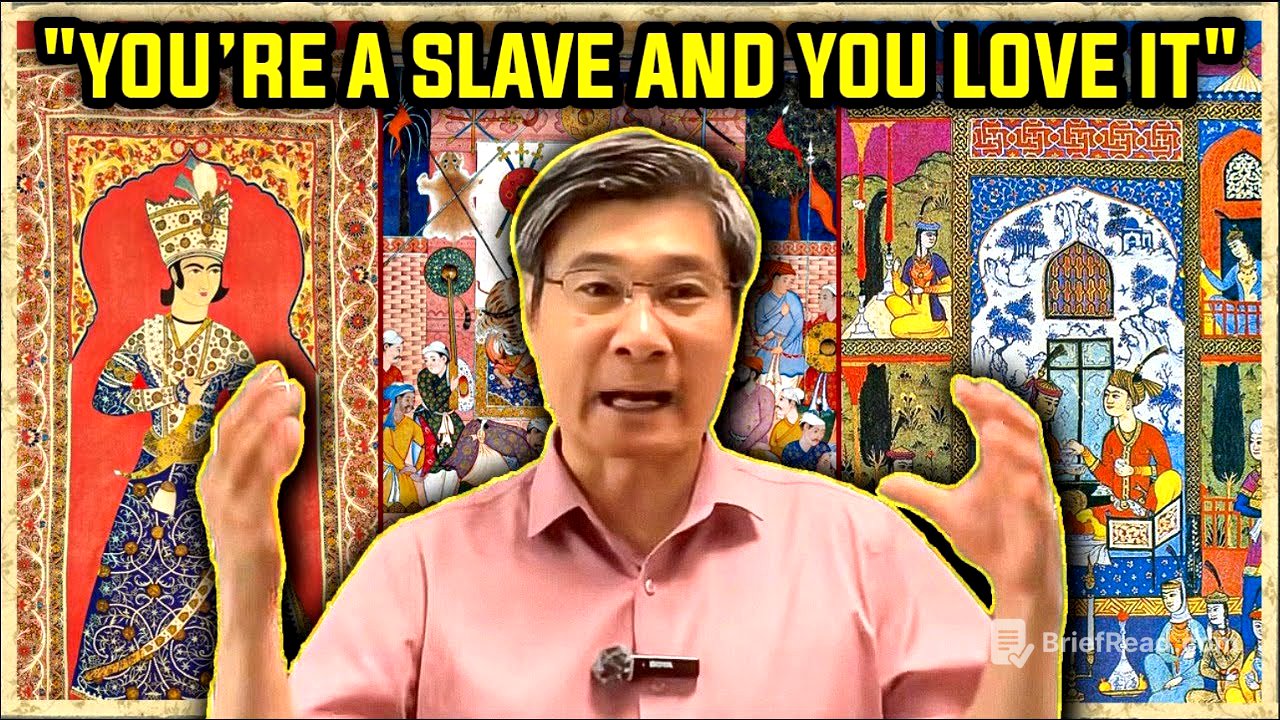TLDR;
The video discusses the transition from a worker-centric society to a consumer-centric society, arguing that consumerism is a form of modern slavery. It explains how after World War II, industrialized societies adopted elements of communism/socialism, focusing on the well-being of workers. However, in the 1980s, a shift occurred with the "revolt of the elite," leading to neoliberalism and a focus on consumerism. This shift dismantled the power of the working class by promoting competition and individualism through the pursuit of material goods and social media validation, ultimately creating a system where people are enslaved by their desires and unable to rebel.
- Post-WWII societies focused on workers due to their value creation.
- The 1980s saw a shift to consumerism driven by the "revolt of the elite."
- Consumerism fosters competition, individualism, and economic logic.
- Consumerism is presented as a "perfection of slavery" where people are controlled by their desires and unable to rebel.
Introduction: The Perfection of Slavery [0:00]
The speaker introduces the concept of consumerism as the "perfection of slavery," where individuals are unaware of their subjugation because they willingly participate in and enjoy the system. This willing participation prevents rebellion, making consumerism a powerful tool for control. The video aims to explain how societies transitioned from prioritizing workers to prioritizing consumers, and the implications of this shift.
The Rise of the Worker-Centric Society [0:40]
Following World War II, industrialized societies, including those in Europe and the United States, adopted aspects of communist ideology by placing the worker at the center of society. This was driven by the recognition that workers create value, unlike money, which is merely speculative. As a result, workers gained rights through unions and political reforms, leading to improved healthcare, public education, and affordable universities. The 1950s, 60s, and 70s represented the peak of societal well-being for the working class.
The Revolt of the Elite and the Shift to Consumerism [1:49]
In the 1980s, a shift began to occur due to what is described as the "revolt of the elite." The egalitarian nature of a worker-centric society was perceived as a problem by the elite, who desired to maintain power and wealth. This revolt manifested as the Reagan revolution in the United States and Thatcherism in Britain, marking the beginning of neoliberalism and free-market capitalism. This transition required moving away from the worker as the central organizing unit and embracing an ideology that allowed the elite to accumulate power. The speaker highlights the radical nature of this shift by pointing out the explosion of CEO compensation compared to average worker salaries.
The Destruction of the Working Class and the Rise of the Consumer [3:36]
To facilitate the shift in power, the working and middle classes needed to be dismantled. This was achieved by introducing the concept of the consumer. While governments in the 50s-70s promised good jobs to citizens, in the 80s, the promise shifted to low prices and a wide selection of goods. This shift had revolutionary implications for society and politics.
The Impact of Consumerism: Competition and Individualism [4:17]
The speaker illustrates the effects of consumerism by using a hypothetical scenario where everyone receives $1 million. The immediate result is a rush to purchase status symbols like houses, followed by social media postings to showcase these acquisitions. This creates competition and debt as individuals strive to outdo each other. Ultimately, consumerism leads to individualism, preventing collective action and solidarity. It fosters an "economic logic" where everything is viewed through the lens of capital, influencing personal relationships and decision-making.
Consumerism as the Perfection of Slavery [6:58]
The speaker concludes by reiterating that consumerism is the "perfection of slavery" because individuals are unaware and accepting of their condition. Unlike traditional slavery, where rebellion is common, consumerism is embraced, making it a perfect system for control. This system achieves the desires of the elite while the masses are unwilling or unable to protest, leading to a state where consumerism is seen as the end of history.






![[LIVE] Nebius Group (NBIS) Q2 Earnings Report & Conference Call](https://wm-img.halpindev.com/p-briefread_c-10_b-10/urlb/aHR0cDovL2ltZy55b3V0dWJlLmNvbS92aS90dm9oT1ZtaWxYby9ocWRlZmF1bHQuanBn.jpg)


